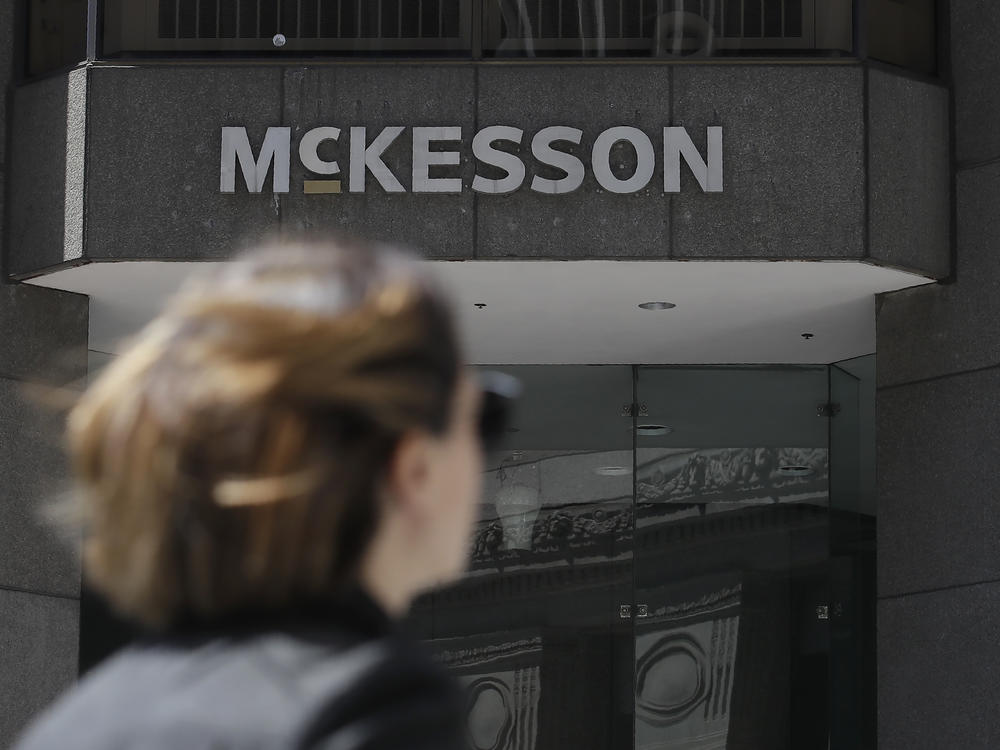Section Branding
Header Content
States Are Near A $26 Billion Opioid Settlement With Drug Distributors
Primary Content
Updated July 20, 2021 at 6:26 PM ET
A landmark national opioid settlement now being finalized would provide as much as $26 billion to states and communities struggling to respond to the opioid crisis.
That's according to a team of attorneys representing governments involved in the litigation who briefed reporters Tuesday.
Sources have told NPR a final deal could be reached as early as this week, but details are still being negotiated.
"This is a complex document," said Joe Rice with the firm Motley Rice, which represents dozens of state and local governments that have sued the drug industry. "You have to be very cautious that you don't have unintended consequences. I don't think there's anything I would call critical issues but there are some issues that have to get resolved."
The settlement's funds would be paid out over a 17-year period by the drug maker Johnson & Johnson as well as three of the nation's largest drug distributors: AmerisourceBergen, Cardinal Health and McKesson.
The firms face a wave of lawsuits for their alleged role in spurring opioid distribution at a time when addiction and overdose deaths were surging.
According to attorneys involved in the talks, the deal would also mean much closer scrutiny for drug firms distributing and selling highly addictive pain pills.
"As a result of this settlement, if it goes forward the light switch is flipped on," said Paul Geller with Robins Geller Rudman & Dowd.
He said companies would have to share opioid distribution data with each other and with regulators to prevent over-supplying communities with pain pills.
A final deal would be sent to state and local governments which would decide whether to opt in. The scale of payouts would be linked to the number of jurisdictions that agree to settle lawsuits.
At least one hard-hit state has already signaled doubts about the deal.
West Virginia Attorney General Patrick Morrisey sent a statement to NPR Monday afternoon saying his state "is very likely a no on these agreements."
According to Morrisey, the structure of the payouts would favor large states without properly taking into account which communities faced the biggest wave of addiction and overdose deaths.
"I will keep fighting to protect West Virginia and will not allow larger states to dictate how we hold defendants accountable for their actions," Morrisey said in his statement.
The drug firms have consistently denied any wrongdoing and declined to comment on negotiations except to say that they're working toward a global settlement.
While a national resolution for opioid lawsuits isn't yet final, New York's attorney general announced early Monday that her state has reached a $1.1 billion settlement with the opioid distributors.
"McKesson and Cardinal Health and AmerisourceBergen distributed this poison, these opioids, without regard to human life and without any consideration of the national crisis," said New York Attorney General Letitia James in an interview with NPR.
The companies, which rank among the largest corporations in the U.S., will spread out their payments to New York over the next 17 years. They will again admit no wrongdoing.
In a joint statement, the firms said they expect the deal to resolve all opioid lawsuits in New York state.
"While the companies strongly dispute the allegations at issue in the trial, they believe this resolution will allow the companies to focus their attention and resources on the safe and secure delivery of medications and therapies while delivering meaningful relief to affected communities," their statement said.
Last month, the New York attorney general's office settled separately with Johnson & Johnson for payments expected to total roughly $230 million.
This development came as the companies faced the prospect of a lengthy civil trial in New York. A separate trial against the drug distributors is underway in West Virginia, with closing arguments expected next week.
A federal opioid trial against pharmacy chains, including CVS and Walgreens, is scheduled to begin in October in Ohio.
According to the Centers for Disease Control and Prevention, more than 500,000 Americans have died during the opioid epidemic, which began with the aggressive sale and marketing of prescription painkillers in the late 1990s.
Preliminary data from the CDC found overdose deaths hit a deadly new record last year with roughly 93,000 fatalities.
Copyright 2021 NPR. To see more, visit https://www.npr.org.

